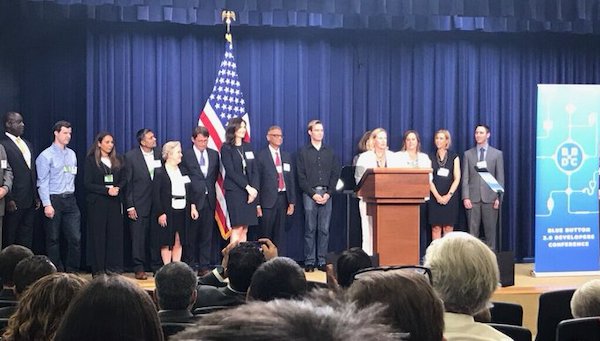health IT systems
See the following -
Cloud Providers Reaffirm Commitment to Open Healthcare Interoperability During 2019 Blue Button Developers Conference
 As healthcare evolves across the globe, so does our ability to improve the health and wellness of communities. Patients, providers, and health plans are striving for more value-based care, more engaging user experiences, and broader application of machine learning to assist clinicians in diagnosis and patient care. Too often, however, patient data are inconsistently formatted, incomplete, unavailable, or missing - which can limit access to the best possible care. Equipping patients and caregivers with information and insights derived from raw data has the potential to yield significantly better outcomes. But without a robust network of clinical information, even the best people and technology may not reach their potential...
As healthcare evolves across the globe, so does our ability to improve the health and wellness of communities. Patients, providers, and health plans are striving for more value-based care, more engaging user experiences, and broader application of machine learning to assist clinicians in diagnosis and patient care. Too often, however, patient data are inconsistently formatted, incomplete, unavailable, or missing - which can limit access to the best possible care. Equipping patients and caregivers with information and insights derived from raw data has the potential to yield significantly better outcomes. But without a robust network of clinical information, even the best people and technology may not reach their potential...
- Login to post comments
Data Management for Large-scale COVID-19 Immunization: This is all not as simple as it seems
 There is a global race for the development of a vaccine for the SARS-CoV-2 virus that causes COVID-19. Finding a vaccine that works and receives approval is only part of the process. There are a series of other steps that need to be taken so that the vaccine can be delivered. These include the mass production of the vaccine, shipment, administration and record-keeping. This may be even more complex as there may be several vaccines. In this article we review some of these issues with a particular focus on the United States.
There is a global race for the development of a vaccine for the SARS-CoV-2 virus that causes COVID-19. Finding a vaccine that works and receives approval is only part of the process. There are a series of other steps that need to be taken so that the vaccine can be delivered. These include the mass production of the vaccine, shipment, administration and record-keeping. This may be even more complex as there may be several vaccines. In this article we review some of these issues with a particular focus on the United States.
- Login to post comments
Getting Health IT on the Blockchain Bandwagon
 Face it: health care IT infrastructure is a mess. After spending tens of billions of dollars to "incent" providers to move to EHRs, they're using them but are not very happy with them. In a world in which health IT systems should help improve patient care, they're seen more as a burden than as an asset. We now have millions of electronic records that are still way too siloed, and all too often incomplete. Worse yet, when those records aren't being hacked, they are being held captive by ransomware. Enter blockchain.
Face it: health care IT infrastructure is a mess. After spending tens of billions of dollars to "incent" providers to move to EHRs, they're using them but are not very happy with them. In a world in which health IT systems should help improve patient care, they're seen more as a burden than as an asset. We now have millions of electronic records that are still way too siloed, and all too often incomplete. Worse yet, when those records aren't being hacked, they are being held captive by ransomware. Enter blockchain.
- Login to post comments
HIMSS16 - HHS Secretary Sylvia Mathews Burwell Opens Conference
 Visionary healthcare leader – Secretary of the Department of Health and Human Services Sylvia Mathews Burwell - will speak at HIMSS16 during the opening keynote session on Monday, Feb. 29, from 5-7 p.m. PST. “We welcome Secretary Burwell to this exciting program we have developed for HIMSS16,” said HIMSS Executive Vice President Carla Smith, MA, FHIMSS, CNM. “As a prominent leader opening our conference, we look forward to hearing her remarks and guidance, as we work to advance health IT systems that bring the right information to the right person at the right time to make the right healthcare decisions.”
Visionary healthcare leader – Secretary of the Department of Health and Human Services Sylvia Mathews Burwell - will speak at HIMSS16 during the opening keynote session on Monday, Feb. 29, from 5-7 p.m. PST. “We welcome Secretary Burwell to this exciting program we have developed for HIMSS16,” said HIMSS Executive Vice President Carla Smith, MA, FHIMSS, CNM. “As a prominent leader opening our conference, we look forward to hearing her remarks and guidance, as we work to advance health IT systems that bring the right information to the right person at the right time to make the right healthcare decisions.”- Login to post comments
Mario Hyland Makes The Case For Continuous Interoperability
 Interoperability has been a key buzz word heard along the road toward modernizing the American healthcare system. But standards, conformance to those standards, and thorough testing to ensure conformance are all required to achieve true, seamless information exchange. That’s the message advocated by Mario Hyland, senior vice president and founder of AEGIS, a consulting firm focused on advancing a health IT testing infrastructure. Hyland spoke with Clinical Innovation + Technology about current interoperability and testing challenges.
Interoperability has been a key buzz word heard along the road toward modernizing the American healthcare system. But standards, conformance to those standards, and thorough testing to ensure conformance are all required to achieve true, seamless information exchange. That’s the message advocated by Mario Hyland, senior vice president and founder of AEGIS, a consulting firm focused on advancing a health IT testing infrastructure. Hyland spoke with Clinical Innovation + Technology about current interoperability and testing challenges.
- Login to post comments
Thomas Verbeck: Sharing Medical Data Saves Lives
As a former chief information officer with a long career in information technology, my focus has intensified since the Department of Defense announced plans to spend $11 billion on a new EHR system - one that can seamlessly exchange health data for the country's nearly 10 million employees, military personnel, retirees and their families. But the DoD's plan will fail. That's because most of today's EHR systems, including the bidder finalists, are designed only to work within their own system. That allows them to charge physicians and hospitals outside their system for access to your data. DoD can demand a system that seamlessly connects health data with civilian hospitals - or the VA - but it has failed to do so.
Two New Federal Reports Released That Have Major Public Health Impacts
 Two new Federal reports were recently released that have a public health impact. First, the Office of the National Coordinator for Health Information Technology (ONC) released its 2022 Report to Congress: Update on Access, Exchange, and Use of Electronic Health Information. This report covers the current state of adoption of health information technology and access to electronic health information guided largely by the requirements of the 2016 21st Century Cures Act. The report observes that, “Although tremendous progress has been made with EHRs that capture and support the use of health information about individuals, the COVID-19 pandemic exposed gaps in health IT systems that support capturing and using population data. The challenges exposed during the public health response to the COVID-19 pandemic pinpointed the importance of health IT to monitor population health regarding public health surveillance of testing, diagnosis, and vaccine distribution.”
Two new Federal reports were recently released that have a public health impact. First, the Office of the National Coordinator for Health Information Technology (ONC) released its 2022 Report to Congress: Update on Access, Exchange, and Use of Electronic Health Information. This report covers the current state of adoption of health information technology and access to electronic health information guided largely by the requirements of the 2016 21st Century Cures Act. The report observes that, “Although tremendous progress has been made with EHRs that capture and support the use of health information about individuals, the COVID-19 pandemic exposed gaps in health IT systems that support capturing and using population data. The challenges exposed during the public health response to the COVID-19 pandemic pinpointed the importance of health IT to monitor population health regarding public health surveillance of testing, diagnosis, and vaccine distribution.”
- Login to post comments